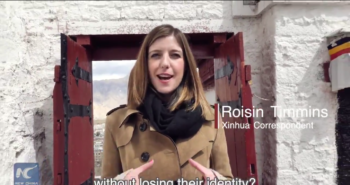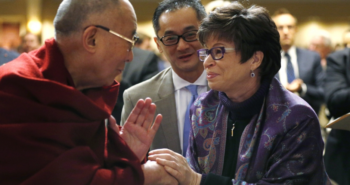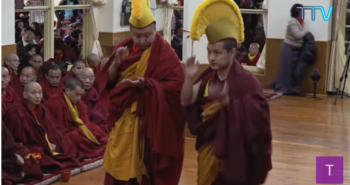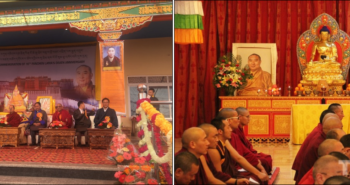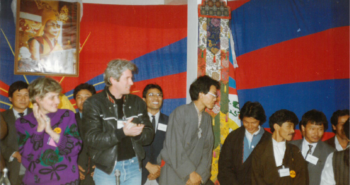There are many ways to define privilege. One might be who gets to go where. If you’re Roisin Timmins, you get exclusive access to Tibet, one of the world’s most geographically and politically secluded countries, which is currently in the stranglehold of China’s stringent isolation policies.
One of the benefits of my work in Washington, D.C. has been the opportunity to meet a wide section of policy makers and public figures in the course of accompanying Mr. Lodi Gyari, the Special Envoy of His Holiness the Dalai Lama (and Executive Chairman of ICT Board), for meetings. One such Mr. Gyari would meet during the Obama Administration was Mrs. Valerie Jarrett. Her official title was “senior adviser to President,” but it was no secret that she was more than that. She was a friend and confidante to the Obama family. Her views and gestures showed that she had deep reverence for His...
A play about a Tibetan Buddhist nun who self-immolates leading to an explosion of violence gave a rare prominence to discussions on contemporary Tibet in a cultural sphere as ‘Pah-La’ concluded its run at the Royal Court Theatre in London. Pah-La situates its action in contemporary Tibet in 2008, featuring the self-immolation of a Buddhist nun, staged with the whiff of kerosene and circuit of flames inches from the audience that shoot towards the ceiling before the space is plunged into blackness.
It is with deepest sorrow that International Campaign For Tibet (ICT) & The Rowell Fund for Tibet announce the passing of Tony (Edward Anthony) Rowell on February 16th, 2019, at the age of 50. Tony was part of the ICT family since 2003 when he, along with former ICT President John Ackerly, helped develop the Rowell Fund in honor of his late father Galen Rowell, a famed photographer and mountaineer, who was an avid supporter of the Tibetan cause.
In the past three months, there have been multiple heavy snowfalls in Yulshul Prefecture. Among its six counties, Dzatoe, Dritoe, Chumarlep and Tridu counties have been affected badly by the consecutive snowstorms. Dzatoe County is the most severely affected county from all Tibetan areas in this winter.
On February 23, 2019, I was at UMass Amherst to participate in an event to thank Representative Jim McGovern on the successful passage of the Reciprocal Access to Tibet Act. Acknowledging the International Campaign for Tibet’s close involvement at all stages in the legislative process on the Act, we were invited to speak at the event that saw Tibetan Americans and Tibet supporters not just from UMass, but also from Amherst and neighboring areas as well as from Boston and Connecticut.
The first day of Losar, or New Year, in the Female Earth-Pig year fell on February 5 this year. Losar is celebrated by Tibetans and people in the Himalayan region and includes a combination of early morning religious rituals followed by social festivities.
January 28, 2019 marks the 30th anniversary of the passing of the 10th Panchen Lama. It is interesting to see that his death anniversary was observed in China as well as by the Tibetan community in the free world. These observations included a ceremony in northern India and a daylong discussion with an evening ceremony and concert in New York. Tibetan Minister Kalon Karma Gelek Yuthok had this to say about the 10th Panchen Lama at an event held in Dhondupling Tibetan settlement near Dehra Dun on January 26, 2019:
We are in the 49th day period after the passing away of Kasur Lodi G. Gyari, or as he is universally known to the Tibetan-speaking world (as well as to Himalayan community), Gyari Rinpoche. Rinpoche is a title with which we refer to incarnated individuals, and he was recognized as one at an early age, while in Tibet. The 49th day after death is an important landmark in Buddhism. In the broader context of the theory of the transmigration of consciousness, it takes at least 49 days after death for the consciousness to proceed on the path of rebirth.
“You’re not going to see something that’s like ‘Seven Years in Tibet’ anymore,” says Larry Shinagawa, professor at Hawaii Tokai International College, in a recent New York Times piece titled “How China Is Rewriting Its Own Script.” That’s cause for concern, because when I was growing up, movies like “Seven Years in Tibet” and “Kundun,” both of which opened in 1997, helped introduce me—and surely many Americans in my generation—to the Tibetan issue.

